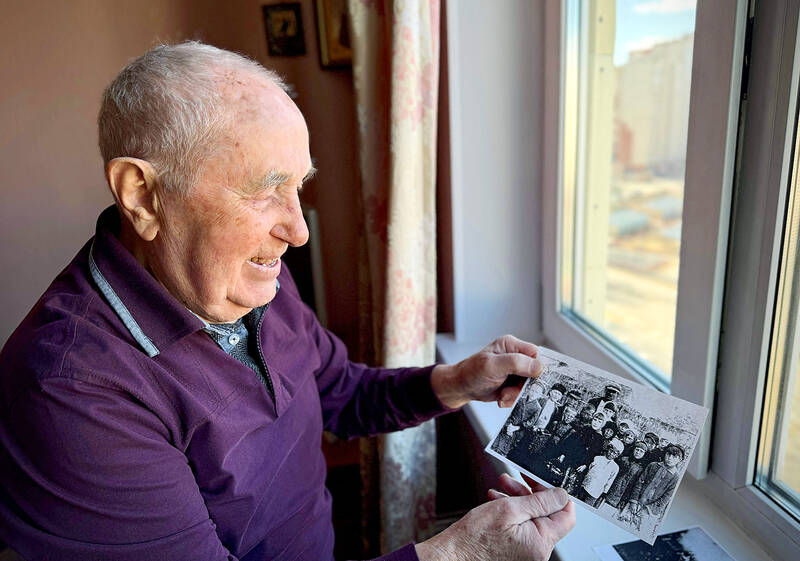Aged 92, Viktor Gladyshev is the protagonist of a “docufiction,” or the cinematic combination of documentary and fiction, that traces his childhood in a corner of Russia occupied by the Nazis during World War II (WWII).
Gladyshev lived under the German occupation for three months as a child and only narrowly avoided being executed at the age of eight.
Sitting in his modest apartment just outside Moscow, he said he remembers the 1941 occupation “as if it were yesterday.”

Photo: AFP
His experience is recounted in Iyunskaya polyn (June Wormwood), a film by Yuliya Bocharova released last month, in the run-up to Victory Day celebrations in Moscow on Friday next week.
The film about his life is supported by the Presidential Fund for Cultural Initiatives, a Kremlin-affiliated body.
Russian authorities have sought to stir up patriotic fervor around the 80th anniversary of WWII victory to boost support for its offensive on Ukraine, which began in 2022.
The Kremlin portrays the current conflict as a continuation of the one against Hitler, claiming to be fighting Ukrainian “neo-Nazis.”
Hitler’s troops invaded the Soviet Union in June 1941, and three months later, Gladyshev’s father left for the front. He would die there in 1943.
Aged just eight, Gladyshev, the youngest in a large family, found himself orphaned, as his mother had died before the war.
The children moved in with their aunt and uncle in the village of Smolino, near Naro-Fominsk, 70km southwest of Moscow.
‘STALIN IS KAPUTT’
In the autumn of 1941, German soldiers entered the village without firing a shot.
“Moscow is kaputt, Stalin is kaputt, they shouted at us,” recalled Gladyshev, looking at the past through his pale blue eyes. Nine Germans moved into their house. In the evening, the children had to take the German soldiers’ boots off, and in the streets, Russians were ordered to stop every time they ran across a German.
Despite knowing that picking up a Soviet leaflet could mean death, one day he found one and could not resist the urge to tell everyone about it.
“The leaflet read that the enemy had been stopped just near Naro-Fominsk. I told everyone and soon became the hero of the village,” Gladyshev said with a disarming smile.
The morning after, “they took me out for the execution,” he continued unemotionally.
“When I saw the dark barrel of a rifle pointed at my face, I knew I was going to die,” Gladyshev said. “But in that moment, I was rather more interested to see up close how the bullet would be going out of the barrel of the gun.”
Suddenly, his uncle Ivan “threw himself at the German and pinned his rifle to the ground,” he said.
The uncle was then brutally beaten up, but he survived thanks to an Austrian doctor who intervened.
VICTORY PARADES
In October 1941, the evacuation of Moscow was announced as Hitler’s forces approached the capital.
In Smolino, the German unit was replaced by a military orchestra. The mood had changed: The musicians started constantly rehearsing in the village.
Despite the freezing cold, Gladyshev said he followed each rehearsal and watched the conductor closely.
“I became obsessed with the brass instruments,” he said.
The locals found out that the Germans were preparing for a “Victory Parade” on Red Square. However, it was not to be, as the Red Army had already launched a counter-offensive around Moscow in December. The Nazis retreated, taking the villagers with them on a harrowing journey as human shields.
In a village near Borovsk, 130km southwest of Moscow, Gladyshev said he remembers hearing heartbreaking cries coming from a house with boarded-up windows and doors: The inhabitants were being burned alive by Nazi troops.
“There were some good Germans, too,” he said suddenly and smiled.
One officer lent him a knife to cut a piece of meat from a frozen horse’s carcass.
In December 1941, Gladyshev managed to escape and reach Soviet soldiers. He went on to become a trumpet player and in the end it was he, not the German army’s musicians, who got to take part in about 15 Victory Day parades on Red Square.

BRUSHED OFF: An ambassador to Australia previously said that Beijing does not see a reason to apologize for its naval exercises and military maneuvers in international areas China set off alarm bells in New Zealand when it dispatched powerful warships on unprecedented missions in the South Pacific without explanation, military documents showed. Beijing has spent years expanding its reach in the southern Pacific Ocean, courting island nations with new hospitals, freshly paved roads and generous offers of climate aid. However, these diplomatic efforts have increasingly been accompanied by more overt displays of military power. Three Chinese warships sailed the Tasman Sea between Australia and New Zealand in February, the first time such a task group had been sighted in those waters. “We have never seen vessels with this capability

A Japanese city would urge all smartphone users to limit screen time to two hours a day outside work or school under a proposed ordinance that includes no penalties. The limit — which would be recommended for all residents in Toyoake City — would not be binding and there would be no penalties incurred for higher usage, the draft ordinance showed. The proposal aims “to prevent excessive use of devices causing physical and mental health issues... including sleep problems,” Mayor Masafumi Koki said yesterday. The draft urges elementary-school students to avoid smartphones after 9pm, and junior-high students and older are advised not

Philippine President Ferdinand Marcos Jr has fired his national police chief, who gained attention for leading the separate arrests of former Philippine president Rodrigo Duterte on orders of the International Criminal Court and televangelist Apollo Carreon Quiboloy, who is on the FBI’s most-wanted list for alleged child sex trafficking. Philippine Executive Secretary Lucas Bersamin did not cite a reason for the removal of General Nicolas Torre as head of the 232,000-member national police force, a position he was appointed to by Marcos in May and which he would have held until 2027. He was replaced by another senior police general, Jose

POWER CONFLICT: The US president threatened to deploy National Guards in Baltimore. US media reports said he is also planning to station troops in Chicago US President Donald Trump on Sunday threatened to deploy National Guard troops to yet another Democratic stronghold, the Maryland city of Baltimore, as he seeks to expand his crackdown on crime and immigration. The Republican’s latest online rant about an “out of control, crime-ridden” city comes as Democratic state leaders — including Maryland Governor Wes Moore — line up to berate Trump on a high-profile political stage. Trump this month deployed the National Guard to the streets of Washington, in a widely criticized show of force the president said amounts to a federal takeover of US capital policing. The Guard began carrying